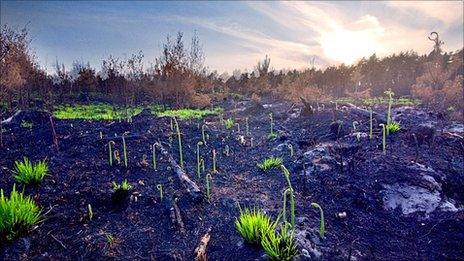Swinley Forest fire: Plants and wildlife start recovery
- Published

Fires burned for four days in early May
Ferns and wild grasses have begun to poke through the blackened earth around Swinley Forest following a devastating fire in May.
The rare heathland habitat near Crowthorne in Berkshire is beginning to recover from days of scorching fire.
The bracken and purple moor grass provides vegetation for wildlife such as rare nightjar birds and woodlarks, green tiger beetles and emperor moths.
The mature woodland in the forest could take as long as 20 years to recover.
Des Sussex, conservation officer for Natural England, said: "The heathland is a really special and important habitat.
"The purple moor grass and bracken, the heather and gorse are all sprouting in areas where the fire burned across the top of the ground but left the roots intact.
"Where the fire burned down into the ground and destroyed the roots it will take longer, as seeds will have to germinate before the plants return."
Swinley Forest, near Ascot, is part of a Special Protection Area (SPA) for three rare birds: Dartford warblers, woodlarks and nightjars.
The birds all nest on the ground and will suffer alongside reptiles such as adders and slow-worms if there is a lack of cover.
In addition, Swinley Forest is populated by emperor moths and Grayling butterflies which rely on brambles and grassland to lay their eggs and hatch out caterpillars.
However, Mr Sussex said the bracken could reach 5ft (1.5m) high in the next five weeks.
John Deakin, the chief forester for the Crown Estates, which owns part of Swinley Forest, said: "Nature never ceases to surprise me.
"The reason the fire was so prevalent was because it was burning a lot of dead vegetation.
"The timing for new vegetation to come through this year was absolutely spot on."
Fires raged over 200 hectares (two square kilometres) of Swinley Forest for days in early May.
The 2600-acre (1052-hectare) forest contains conifer pine trees that are managed as timber crop.
Areas of open ground contain heather, grasses and bracken.